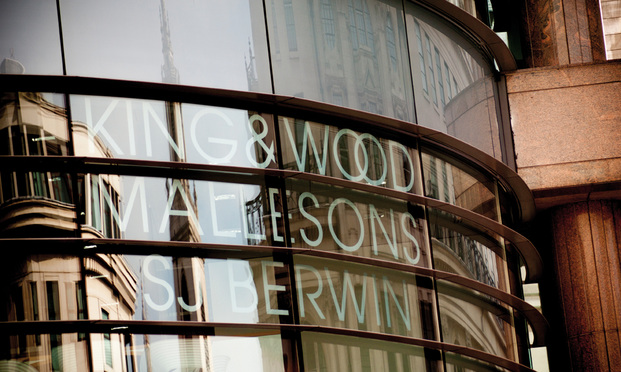When Will Chinese Firms Start Investing in Their U.S. Offices?
Many are little more than "window offices"—a liaison point for client relationships. But to become a truly global player, Chinese firms will need to change that.
March 10, 2020 at 12:00 PM
4 minute read

In January, King & Wood Mallesons hired the entirety of U.K. firm Mishcon de Reya's legacy New York office. The nine-lawyer team is one of the largest group hires the Sino-Australian firm has ever made for its U.S. operations; it's perhaps also one of the largest ever made in the United States by a Chinese firm.
While the expansion may be new, King & Wood Mallesons has been in the United States for nearly 20 years. Legacy King & Wood opened a Silicon Valley office, its first outside of China, in 2001. The firm launched its second U.S. office in New York in 2008. And, of course, King & Wood wasn't the only one.
In 1993, only four years into its existence, JunHe launched the first overseas office of any Chinese law firm, in New York. The firm's Silicon Valley office was opened in 2010 in Palo Alto. Another major firm, Zhong Lun, followed suit much later. It opened its first U.S. office in New York in 2013. In 2016, the firm took over the legacy San Francisco and Los Angeles offices of Dacheng as the latter combined with Dentons.
Despite a long history, Chinese firms' U.S. operations remain relatively invisible. In fact, many are often described as "window offices"—those that primarily serve as a liaison office or point of contact for client relationships. Like other overseas offices, U.S. offices are usually complementary to a firm's home base in China. Traditionally, they are staffed by U.S.-qualified lawyers, but few are actually practicing U.S. law. Partners based in the United States often work on matters handled by domestic Chinese offices; sometimes they help Chinese clients find other U.S. lawyers; and they occasionally need to be in the United States for personal reasons, immigration-related or otherwise.
On the other hand, around the time of JunHe's New York launch, China started allowing foreign law firms to set up representative offices. Nearly 30 years later, despite the various sizes of foreign firms' China operations, it's safe to say that they have had a bigger influence than most Chinese firms' U.S. offices. This, of course, has many causes, chiefly the disparity in the roles of the Chinese and American legal professions in the world.
Chinese firms are cautious about investing in the United states. They have increased investment in Hong Kong in recent years, but U.S. offices still seem one step too far. Opening a physical office on either coast isn't hard, but finding the right people is. Most Chinese firms have made significant financial improvements, but their rates and compensation are still a far cry from the top tier of U.S. firms.
Having a successful U.S. practice could be essential to many firms' goal of becoming truly global players. In the cross-border matters Chinese firms handle, they would no longer need to share work with a U.S. firm.
Before taking over the Mishcon team, King & Wood Mallesons had already been making a noticeable push in its U.S. practice for more than a year. Compared with the more general cross-border expertise evident at many Chinese firms' U.S.-based lawyers, King & Wood has made more targeted hires.
In late 2018, following the Trump administration's move to restore sanctions against Iran, the firm recruited a former Manhattan assistant district attorney who specialized in prosecuting sanctions law violations. After the administration pushed through its tax reform bill, the firm recruited a tax partner from Cahill Gordon & Reindel. The most recent hires, which include several patent litigators, came as technology and intellectual property took center stage in the never-ending bilateral trade dispute between China and the United States.
Others will be watching. If King & Wood Mallesons is successful, more will follow suit.
Email: [email protected]
This content has been archived. It is available through our partners, LexisNexis® and Bloomberg Law.
To view this content, please continue to their sites.
Not a Lexis Subscriber?
Subscribe Now
Not a Bloomberg Law Subscriber?
Subscribe Now
NOT FOR REPRINT
© 2025 ALM Global, LLC, All Rights Reserved. Request academic re-use from www.copyright.com. All other uses, submit a request to [email protected]. For more information visit Asset & Logo Licensing.
You Might Like
View All

O'Melveny, White & Case, Skadden Beef Up in Texas With Energy, Real Estate Lateral Partner Hires
5 minute read
Arizona Supreme Court Presses Pause on KPMG's Bid to Deliver Legal Services
Law Firms Mentioned
Trending Stories
- 1Texas Asks Trump DOJ to Reject Housing Enforcement
- 2Ideas We Should Borrow: A Legislative Wishlist for NJ Trusts and Estates
- 3Canadian Private Equity Firms Are Eyeing Tech Sector
- 4Former CIA General Counsel Joining Hilton Worldwide as Legal Chief
- 5X Faces Scrutiny as EU Investigates Possible Breach of Content Moderation Standards
Who Got The Work
J. Brugh Lower of Gibbons has entered an appearance for industrial equipment supplier Devco Corporation in a pending trademark infringement lawsuit. The suit, accusing the defendant of selling knock-off Graco products, was filed Dec. 18 in New Jersey District Court by Rivkin Radler on behalf of Graco Inc. and Graco Minnesota. The case, assigned to U.S. District Judge Zahid N. Quraishi, is 3:24-cv-11294, Graco Inc. et al v. Devco Corporation.
Who Got The Work
Rebecca Maller-Stein and Kent A. Yalowitz of Arnold & Porter Kaye Scholer have entered their appearances for Hanaco Venture Capital and its executives, Lior Prosor and David Frankel, in a pending securities lawsuit. The action, filed on Dec. 24 in New York Southern District Court by Zell, Aron & Co. on behalf of Goldeneye Advisors, accuses the defendants of negligently and fraudulently managing the plaintiff's $1 million investment. The case, assigned to U.S. District Judge Vernon S. Broderick, is 1:24-cv-09918, Goldeneye Advisors, LLC v. Hanaco Venture Capital, Ltd. et al.
Who Got The Work
Attorneys from A&O Shearman has stepped in as defense counsel for Toronto-Dominion Bank and other defendants in a pending securities class action. The suit, filed Dec. 11 in New York Southern District Court by Bleichmar Fonti & Auld, accuses the defendants of concealing the bank's 'pervasive' deficiencies in regards to its compliance with the Bank Secrecy Act and the quality of its anti-money laundering controls. The case, assigned to U.S. District Judge Arun Subramanian, is 1:24-cv-09445, Gonzalez v. The Toronto-Dominion Bank et al.
Who Got The Work
Crown Castle International, a Pennsylvania company providing shared communications infrastructure, has turned to Luke D. Wolf of Gordon Rees Scully Mansukhani to fend off a pending breach-of-contract lawsuit. The court action, filed Nov. 25 in Michigan Eastern District Court by Hooper Hathaway PC on behalf of The Town Residences LLC, accuses Crown Castle of failing to transfer approximately $30,000 in utility payments from T-Mobile in breach of a roof-top lease and assignment agreement. The case, assigned to U.S. District Judge Susan K. Declercq, is 2:24-cv-13131, The Town Residences LLC v. T-Mobile US, Inc. et al.
Who Got The Work
Wilfred P. Coronato and Daniel M. Schwartz of McCarter & English have stepped in as defense counsel to Electrolux Home Products Inc. in a pending product liability lawsuit. The court action, filed Nov. 26 in New York Eastern District Court by Poulos Lopiccolo PC and Nagel Rice LLP on behalf of David Stern, alleges that the defendant's refrigerators’ drawers and shelving repeatedly break and fall apart within months after purchase. The case, assigned to U.S. District Judge Joan M. Azrack, is 2:24-cv-08204, Stern v. Electrolux Home Products, Inc.
Featured Firms
Law Offices of Gary Martin Hays & Associates, P.C.
(470) 294-1674
Law Offices of Mark E. Salomone
(857) 444-6468
Smith & Hassler
(713) 739-1250











